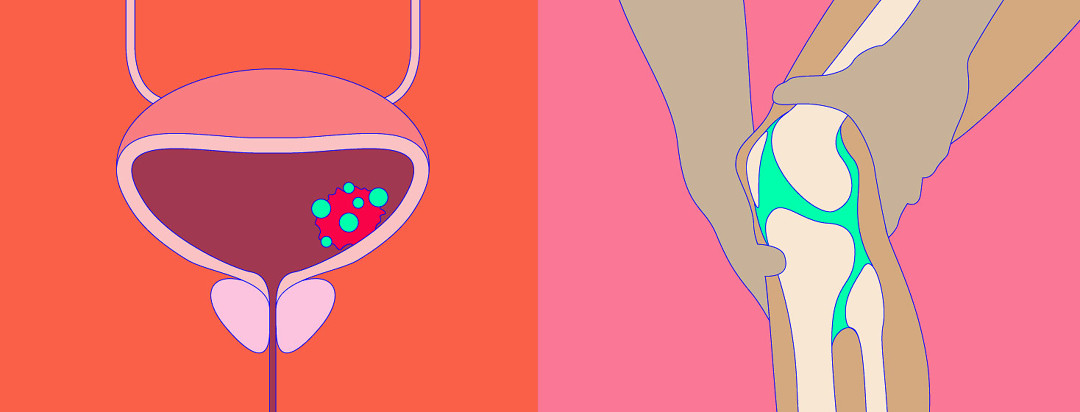Bladder Cancer and BCG Reactive Arthritis
One method used to treat non-muscle invasive bladder cancer is called Bacillus Calmette-Guerin (BCG) treatment. BCG is a type of bacteria. During BCG treatment, the bacteria are put directly into the bladder of the person with cancer. Their body then has an immune response to the bacteria, which also fights the bladder cancer. The idea is to kill the bladder cancer cells.1
BCG can cause side effects. One rare side effect is reactive arthritis, which is also called Reiter's syndrome.2
What is reactive arthritis?
Reactive arthritis is a condition the body can develop in response to an infection. Many types of bacteria can cause reactive arthritis. But it is most likely to be caused by infections in the intestines, genitals, or bladder.3
The most common symptom of reactive arthritis is joint pain. The pain can happen on both sides of the body or only one. Along with the pain, joints may be red, inflamed, or swollen. Joint pain from reactive arthritis is most common in the:3,4
- Knees
- Ankles
- Lower back
- Feet
Other symptoms of reactive arthritis include:3,4
- Eye inflammation
- Difficulty urinating
- Mouth sores
- Rash on the feet or hands
How does BCG reactive arthritis happen?
Because BCG treatment causes a bacterial infection, it does pose a small risk of reactive arthritis. A person who has BCG treatment has a 1 to 6 percent chance of developing reactive arthritis afterward. Symptoms usually begin 1 to 3 weeks after the treatment.2
Experts still do not fully understand why the body sometimes responds to a bacterial infection with reactive arthritis. Some research suggests that it is caused by an overactive immune system. BCG treatment works by activating the immune system to fight cancer cells. So, it is possible that the immune system can become too active and begin to attack the body’s own joints. This causes the arthritis.2,4
What are the risk factors for reactive arthritis?
Experts also do not understand why some people develop reactive arthritis after BCG treatment. Some research shows it may be linked to a specific gene that some people have. However, many people who have this gene never develop reactive arthritis.2,4
It is also possible that men are more likely than women to develop reactive arthritis. More research is needed to fully understand the causes of reactive arthritis.2,4
How is reactive arthritis diagnosed?
Reactive arthritis often can be difficult to diagnose. If you experience symptoms of reactive arthritis after BCG treatment, contact your doctor. Make sure they are aware of your BCG treatment history.2,3
It is possible that your doctor will use tests to make a diagnosis, including:3,4
- Blood tests
- Joint fluid tests, in which your doctor removes fluid from an inflamed joint with a needle
- X-rays, which can also rule out other types of arthritis
How is reactive arthritis treated?
If you are still receiving BCG treatment after a reactive arthritis diagnosis, the treatment will most likely need to be stopped. Additionally, you may need to take medicine to manage reactive arthritis.
These medicines might include:3,4
- Non-steroidal anti-inflammatory drugs (NSAIDs) – these are a common type of drug used to treat pain and inflammation. One over-the-counter example is ibuprofen. Indomethacin is a prescription NSAID that is used to treat reactive arthritis.
- Steroid injections – these can reduce inflammation and other symptoms in the affected joints.
- Rheumatoid arthritis drugs – these drugs may also relieve symptoms. However, this type of treatment is less common.
Want to talk to others about their BCG experiences? Search our forums.
Community Poll
Have you taken our In America survey yet?

Join the conversation